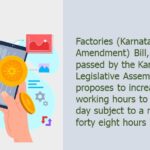The Finance Bill, 2021 has been introduced in the Lok Sabha on 1st February, 2021 and has proposed various amendments under Direct and Indirect taxes.
A. Key changes proposed to be brought in vide Finance Bill, 2021 under the Income Tax Act, 1961:
1. In order to incentivise non-cash transactions to promote digital economy and to further reduce compliance burden of small and medium enterprises it is proposed to amend Section 44AB to increase the threshold limit for tax audit from INR 5 crore to INR 10 crore in case of assesses where cash transactions do not exceed 5%, w.e.f 1st day of April, 2021.
2. A new Section 194Q –“Tax Deduction at Source (TDS) on purchase of goods” is proposed to be inserted w.e.f 1st day of July, 2021, which requires a buyer of goods to withhold tax at the rate of 0.1% of the purchase consideration payable to a resident seller in excess of INR 50 lakhs in financial year. Buyers whose total sales, gross receipts or turnover from the business carried on by him does not exceed INR 10 crores in the preceding the financial year have been exempted from withholding tax under this section. However, it is also proposed to provide that the provisions of this section shall not apply to – a transaction on which tax is deductible under any provision of the Act; and a transaction, on which tax is collectible under the provisions of section 206C other than transaction to which of section 206C (1H) applies.
This has made the provisions of TCS on sale of goods u/s 206C(1H) virtually redundant in cases where tax is required to be deducted under this new Section 194Q.
3. A new Section 206 AB relating to “Special provision for deduction of tax at source for non-filers of income tax return” has been inserted with effect from 1st day of July, 2021 requiring the person responsible for making payments (other than salary) to withhold taxes at higher of the following rates in cases where the recipient has not filed his tax returns for the past two assessment years and the taxes withheld in those previous years exceeds INR 50,000.
a. twice the rate specified in the relevant provision of the Act or
b. twice the rate or
c. rates in force or the rate of 5%.
Similar, provisions has been inserted vide Section 206CCA for proving higher returns on TCS for non-filing of returns.
Also, in case the deductee does not furnish his PAN to the deductor, the provisions of Section 206AA shall apply and the tax will need to be deducted at higher of rate as per Section 206AB and Section 206AA.
4. It is proposed to amend Section 234C relating to payment of interest by an assessee who does not pay the advance tax instalments w.e.f 1st day of April, 2021, where it has been proposed to include dividend income in the list of income which is excluded from payment of interest on advance tax. However, deemed dividend shall not be excluded.
5. It has been proposed that w.e.f 1st day of April, 2021, Goodwill of a business or profession will not be considered as a depreciable asset and there would not be any depreciation allowance on goodwill of a business or profession in any situation. In case of purchase /acquired goodwill, the purchase price of the goodwill will continue to be considered as cost of acquisition for the purpose of computation of capital gain subject to depreciation already claimed being reduced from the amount of the purchase price of the goodwill.
6. It is proposed to amend sub section 4 and 5 of Section 139 so as to reduce the time required to file belated return and revised return by 3 months. Thus, any belated return or revised return could now be filed 3 months before the end of the relevant assessment years or before the completion of the assessment, whichever is earlier.
Henceforth, going by the above provision, for taxpayers having due date to file Original Income Tax Return as 31st October or 30th November (in case of transfer pricing) of relevant assessment year will be required to file the belated/revised return by 31st December of relevant assessment year.
7. A new section 245MA “Dispute Resolution Committee” is proposed to be inserted to provide certainty to small and medium taxpayers. Those disputes where the returned income is INR 50 lakhs or less and the aggregate amount of variation proposed in specified order is INR 10 lakhs or less shall be eligible to be considered by this Committee.
8. It has been proposed to reduce the time limit for re-opening of assessment to 3 years from 6 years. However, in case of serious tax evasion cases where there is evidence of concealment of income of INR 50 lakh or more in a year, assessment can be re-opened up to 10 years. Further, the provisions have been introduced to permit the issue of notice by the assessing officer only after obtaining prior approval of the specified authority.
9. It has been proposed to amend Section 255, w.e.f 1st day of April, 2021 to introduce Faceless Proceedings before the Income-Tax Appellate Tribunal (ITAT) by eliminating the interface between the ITAT and parties to the appeal in the course of proceedings to the extent technologically feasible.
10. The existing provision of the Section 80EEA, provides a deduction in respect of interest on loan taken for a residential house property from any financial institution up to INR 1.5 lakhs subject to the condition that the loan has been sanctioned during the period beginning on 1st April, 2019 and ending on 31st March, 2021.This provision allows deduction to the first time home buyers, in respect of interest on home loan. In order to help such first time home buyers further, it is proposed to amend the provision of section 80EEA of the Act to extend the date for sanction of loan from 31st March, 2021 to 31st March, 2022.
11. It is proposed to amend the provisions of Section 80-IAC w.e.f 1st day of April, 2021 to extend the eligibility period for date of incorporation to avail exemptions by eligible start-ups till 1st day of April, 2022 instead of 1st day of April, 2021.
12. Second proviso to Section 194 where tax deduction at source will not be applicable to income credited or paid to certain insurance companies or insurers has further been amended to provide that the provisions of this section shall also not apply to such income credited or paid to a business trust by a special purpose vehicle or payment of dividend to any other person as may be notified. This amendment will take effect retrospectively from 1st day of April, 2020.
13. It is proposed to amend Section 115JB relating to Minimum Alternate Tax (MAT) to provide that if past year income included in books of account during the previous year on account of an Advance Pricing Agreement (APA) or secondary adjustment the assessing officer shall recompute the book profits of the past year(s) and tax payable (if any) on an application made to him in this behave by the taxpayer. This amendment will come into effect from 1st day of April, 2021.
14. It has been proposed to amend the existing sub-section and insert a new sub-section under Section 45, where a partner/ member of the firm/ AOP receives any capital asset or money or other asset at the time of dissolution or reconstitution, which exceeds the balance in their capital account firm/ AOP at the time of dissolution or reconstitution shall be taxable in the hands of such firm/ AOP under the head ‘capital gains’. The proposed amendment has cleared the uncertainty in situations of asset revaluation, where the payment to the partner/ member was in excess of their capital contribution/ balances. Also, any increase in the partner’s capital account pursuant to the revaluation of assets, self-generated goodwill shall be ignored.
15. It has been proposed to insert clause (29A) to section 2 relating to definitions in order to define the term “liable to pay tax”, it has been provided that there stands a liability of tax on the person under the law of any country and will include a case where subsequent to imposition of such tax liability, an exemption has been provided. This amendment will take effect from 1st day of April, 2021.
B. Key changes proposed to be brought in vide Finance Bill, 2020 under the Indirect Taxes are –
Central Goods and Service Tax Act, 2017
1. Scope of supply under Section 7 has been amended retrospectively with effect from the 1st day of July, 2017 to provide for levy of GST on any activities between Club/Association and its members.
2. A new clause under (aa) under Section 16(2) relating to Eligibility and conditions for taking input tax credit is being inserted to provide that input tax credit on invoice or debit note may be availed only when the details of such invoice or debit note have been furnished by supplier under GSTR-1 and such details have been communicated to the recipient.
3. The requirement of filing an Audit Report in Form GSTR-9C certified by a specified professional has been done away with. However, notified class of tax payers shall now be required to file a self-certified statement reconciling the GST returns with audited financial statements which shall form part of annual return in Form GSTR-9 filed under Section 44.
4. Section 50 relating to Interest on delayed payment of tax has been amended retrospectively from July 01, 2017 to provide for interest on net cash payable in case of delayed filing of returns. The said benefit shall not be available in cases where the return is furnished after commencement of any proceedings under Section 73 or Section 74 of the CGST Act, 2017 and in case of non-reporting transactions and the interest is to be payable on that portion of the tax which is paid by debiting the electronic cash ledger.
5. Provisions of Section 107 i.e. Appeals to Appellate Authority has been amended to provide for pre deposit of 25% of penalty amount (i.e. 200% now) for making any appeal against an order specifying the tax and penalty made under sub-section (3) of section 129 by the officer detaining or seizing goods or conveyances.
6. An explanation has been inserted to Section 75(12) relating to determination of tax to clarify that “self-assessed tax” shall also include transactions reported in GSTR-1, even if not reported in GSTR-3B. The amendment shall allow tax authorities to recover such differential tax.
7. Penalty under Section 129 relating to transportation and storage of any goods in contravention of provisions of GST Act. has been increased from 100% to 200%.
8. Section 83 relating to Provisional attachment to protect revenue in certain cases has been amended to provide that powers of attachment of property including bank account as given to the commissioner has been widened to include all proceedings under XII(Assessment), XIV(Inspection, Search, seizure and Arrest) and XV(Demands and Recovery).
9. Form and manner in which the information under section 151 shall be called by the jurisdictional commissioner or any officer authorised by him from any person relating to any matter under this act shall be notified in due course
Integrated Goods and Service Tax Act, 2017
Amendments have been made to the provision for Zero rated supply under Section 16 of the Act as follows –
• Benefit of zero rating for supplies made to SEZ units and SEZ Developer shall be available only when such supplies are made for authorised operations of SEZ, while the earlier provision provided benefit for all supplies made to SEZ
• Refund of input tax credit on export of goods has been linked to realisation of export proceeds within time limit as prescribed under FEMA and any non-realisation would require deposit of the refund received along with interest under Section 50.
• Refund of Integrated tax paid on Zero-rated supply to be allowed only to a notified supplies of goods and or services which are to be notified separately based on recommendations of GST council.
Customs Act, 1962
1. For the purpose of facilitation of trade, it has been proposed to make filing of bill of entry in advance i.e. before the end of the day preceding the day (including the holidays) of arrival of goods mandatory. Earlier the bill of entry was allowed to be filed before the end of the next day following the day of arrival of goods.
2. It has been proposed to use a common Customs Electronic portal ( common portal similar to GSTN) for facilitating registration, filing of bill of entry, shipping bills, payment of duty, serving notices, orders etc in order to encourage paperless processing.
3. Section 25 has been proposed to be amended to prescribe that all conditional exemption unless otherwise specified shall be valid upto 31st March falling immediately after two years from the date of such grant. For the exemptions currently in force, the said period shall be reckoned from 1st day of February, 2021 (i.e. March , 2023).
4. A new section 114AC has been inserted to provide that Penalty proposed for fraudulent utilisation of input tax credit for discharging duty or tax on export of goods under a claim for refund claim and such penalty shall be up to 5 times the refund claimed.
Customs Tariff Act, 1962
1. An amendment has been proposed under Section 9 and 9A of the Act to provide exemptions for articles imported by 100% EOU and SEZ units from the levy of CVD (Counter vailing duty) and ADD (Anti-dumping duty). However, if any notification provides for the applicability of such duties which is to be specifically made applicable to such EOU or SEZ; or in case such articles is either cleared as such into the domestic tariff area or used in the manufacture of any goods that are cleared into the domestic tariff area, in which case, antidumping duty shall be imposed on that portion of the article so cleared or used, as was applicable when it was imported into India.
2. Agricultural Infrastructure and Development Cess has been imposed with effect from 2nd February, 2021 on import of certain agricultural products, fertilizers, wines, liquor, coal, silver in order to finance the improvement of agriculture infrastructure and other development expenditure.
3. Social welfare surcharge on gold, silver, marble and crude is rescinded.
4. Changes have been made in the rates of basic custom duty where basic custom duty on some products like parts of mobile, parts of automobiles, leather, textiles, cotton , solar invertors and lanterns and parts of electronic toys has been increased, whereas import duty on import of products like Iron, steel, gold silver and other precious metals has been decreased. Some of the key changes in basic customs duty (BCD) made effective from 2nd February, 2021 has been highlighted hereunder:
| Sectors / Products Specific | Earlier Rate of Duty | Current rate of Duty |
| Printed circuit board assembly of charger or adapter, inputs or parts for manufacture of Printed Circuit Board Assembly (PCBA) of cellular mobile phones, some parts of mobiles | Nil | 2.5 % |
| Denatured Ethyl Alcohol (ethanol) for use in manufacture of excisable goods | 2.5% | 5% |
| Naphtha | 4% | 2.5% |
| Wet blue chrome tanned leather, crust leather, finished leather of all kinds, including splits and sides of the aforesaid | Nil | 10% |
| Nylon Fibre and Yarn | 7.5% | 5% |
| Waste and scrap of precious metals or metals clad with precious metals | 12.5% | 10% |
| Iron and steel scrap, including stainless steel scrap [up to 31.03.2022] | 2.5% | Nil |
| Primary/Semi-finished products of non-alloy steel | 10% | 7% |
| Screw, bolts, nuts, etc. of iron and steel | 10% | 15% |
| Inputs or parts for manufacture of connectors of cellular mobile phone | Nil | 2.5% |
| Medical Devices imported by International Organization and Diplomatic Missions | Health Cess @ 5% | Health Cess @ Nil |
| Solar lanterns or solar lamps | 5% | 15% |
| Solar Inverters | 5% | 20% |
| Parts of Electronic Toys for manufacture of electronic toys | 5% | 15% |
| Base metals or precious metals clad with precious metals | 12.5% | 10% |
Source: Ministry of Finance




